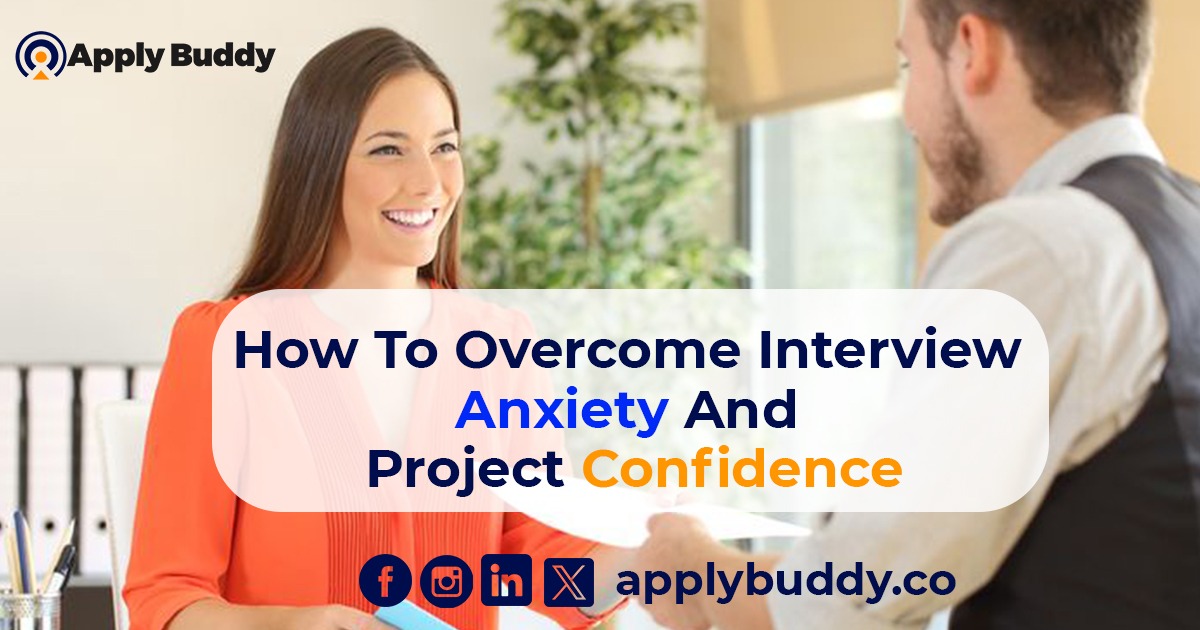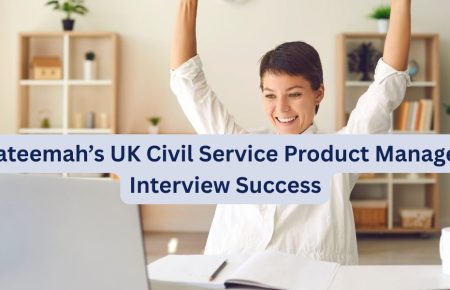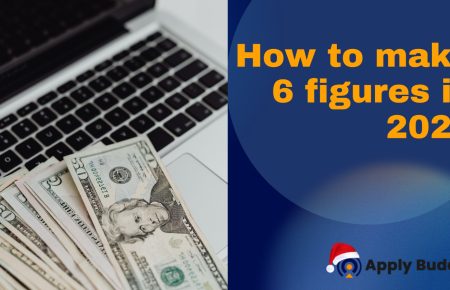Have you been a victim of anxiety during a job interview in 2024? Are you worried about getting sweaty palms or feeling your heart race each time you walk into an interview room? You’re not alone. This ultimate guide on how to overcome interview anxiety and project confidence is for you.
Experiencing interview anxiety is a common challenge many job seekers face today. This phenomenon comes with stories from previous interview experiences or a first-timer’s fear.
However, the good news is that there are effective strategies to help you overcome interview anxiety and project confidence.
Did you know? According to a survey by the American Psychological Association, nearly 61% of adults report feeling nervous about job interviews.
With our expert tips from professional and personal experiences, this article will prepare you for your following job interview and guide you on overcoming interview anxiety and project confidence, helping you make a memorable, positive impression on potential employers.
So, why let nerves be your stumbling block when you can turn them into stepping stones for success?
Without further ado, let’s dive into details on what causes interview anxiety and how it affects you!
What Causes Interview Anxiety and How It Affects You
Many factors cause anxiety during an interview. The pressure to impress your recruiters and fear of judgment can trigger this overwhelming feeling.
Explore some of these causes and how they affect you during your job interview.
- Fear of the unknown
The nature of an interview causes many candidates to feel anxious and unprepared, resulting from the fear of how the interview will unfold or the questions the interviewer may ask. The unpredictability makes it difficult to stay calm, triggering interview anxiety.
- Pressure to perform
The pressure to exceed high expectations and impress your recruiter can lead to anxiety during an interview. Getting nervous from worrying about saying the wrong thing or inadequately showcasing your skills and experiences is possible.
- Self-doubt
The imposter syndrome is a common experience among job seekers during interviews. Thoughts like, ‘Am I good enough?’ can make even the top star cower from lack of confidence. It can make you undermine your skills and experience, which contributes to the feeling of anxiety.
- Lack of preparation
The feeling of being prepared creates a counter-effect to being anxious. Therefore, going to an interview without preparation is like going to a battlefield without weapons. This can put you in a state of anxiety when asked questions you have no answers to.
Looking to prepare for your job interview with RKY Careers? Click here to book your next appointment with an industry expert!

How can Interview Anxiety Affect You
- Physical Symptoms
When anxiety kicks in, your body responds in ways you might not expect. It becomes evident to your interviewer that you are anxious, making it hard to focus during the interview. Feelings of nausea, headache, jittering hands or dizziness can occur during this state.
- Impact on Performance
Anxiety can hinder convincing your interviewer that you have the expected skills and experience to perform well. When your nerves take over, it becomes difficult to express yourself, making you come across as less enthusiastic, affecting your recruiter’s judgment about you.
- Long-term Effects
Repeated experiences of interview anxiety can lead to a cycle of fear, causing multiple cases of anxiousness during every interview. Over time, this can create a long-term issue like general social anxiety, low self-esteem or decreased confidence in professional settings.
Interview Preparation Techniques
- Research the Company: A simple search about the company can give you an edge during your interview. Ensure you learn about the company’s values, mission, or culture to help you confidently answer questions and reflect your skills to their needs.
- Understand the job description: Every information you need about the role you are applying for lies within the job description. Understanding the responsibilities, skills and qualifications required will help you answer questions confidently while connecting them to your past experiences and skills.
- Practice common questions: Practice makes perfect! This phenomenon is your best attempt at overcoming interview anxiety. Practising competency-based or behavioural questions can help reduce your level of anxiety as you become more comfortable and confident in your responses.
- Prepare questions: After every interview, your interviewer asks, “Do you have any questions for us?”. This situation lets you show interest in the role and create a positive impression. Ask intelligent questions about the company’s culture, growth opportunities or upcoming projects.
- Dress the part: Dressing appropriately for an interview creates an opportunity for a great first impression. Choose an outfit that matches the company’s culture and dress code. Feeling good in what you wear can boost your confidence and help you perform better during your interview.
Good to know: You can find detailed personalised interview preparation guide that you can use as a guide on industry expectations and stand out during the recruitment process on RKY Careers.
Effective Pre-Interview Relaxation Techniques to Ease Anxiety
Feeling anxious before an interview is typical. Here are several techniques you can implement to help you avoid interview anxiety and boost your confidence.
1. Deep Breathing
Before you walk into the interview room, take a few minutes to calm your nerves by taking a deep breath. Inhale through your nose for a count of four, hold for four, and exhale through your mouth for four. Doing this routine repeatedly can help calm your mind.
2. Visualisation
Visualisation is a powerful tool that helps reduce stress and put your mind in a state of calm. Imagine yourself succeeding in the interview. Create a picture of yourself answering questions confidently, causing the interviewer to smile. This simple technique can help reduce anxiety.
3. Mindfulness Meditation
Spend a few minutes focusing on the present. Close your eyes and pay attention to your breath or sounds. This practice can help quiet racing thoughts.
4.. Physical Activity
Engage in light exercise before your interview. Physical activities like a brief walk or stretching help release endorphins, improving your mood and reducing stress levels.
5. Positive Affirmations
Positively shaping your mindset can build your confidence and improve your ability to perform well. Repeat positive statements to yourself, like “I am capable” or “I will do well” during this process.

Body language is one of the many ways to convey boldness during an interview. A simple routine can take you from looking timid to projecting confidence. Some of the ways you can project confidence include:
- Stand up straight: This shows your recruiter that you are self-assured and confident in your skills and competence. Keep your shoulders back and maintain a relaxed posture. Avoid crossing your arms, as this can make you appear defensive.
- Use gestures: When responding to questions, use hand gestures to emphasise your points, showing you are engaged and reinforcing your message. Make eye contact with the interviewer to form a connection that shows you are attentive.
- Smile genuinely: Although this may be hard to do, try to wear a smile during your interaction. This act creates a comfortable environment for you and the interviewer.
Finally, practice breathing techniques to help calm your nerves and reduce anxiety, allowing your body language to project your confidence.
How to choose the appropriate attire for an interview
Choosing the right outfit for an interview is an important aspect of interview preparation, as it is essential for making an excellent first impression. Below are 3 critical tips to help you choose the right outfit for your interview.
- Research the company’s dress code before your interview to help you tailor your outfit to fit their rules. If the workplace is formal, opt for a tailored suit or dress. For a more casual setting, business casual could be appropriate.
- Select colours that make you feel confident. Colours are essential as they can be interpreted in several ways. Neutral tones like navy, grey, or black are universally accepted and help you look clean and professional. Avoid overly bright colours or distracting patterns, as they can shift the focus away from you.
- Make sure your clothes fit well and are clean. Inappropriate or wrinkled clothing can convey a lack of professionalism. Pay attention to details, like polished shoes and neat hair. These small touches can enhance your overall appearance and boost your confidence during the interview.

Managing anxiety before and during an interview can help you perform better. Here are 6 effective strategies to help you manage anxiety:
1. Use Relaxation Techniques: Relaxation techniques that involve tensing and relaxing different muscle groups can help keep your nerves in check during the interview. Start from your toes and work your way up to your head, which can release tension and make you feel calm during your interview.
2. Arrive Early to the interview: Ensure you get to the interview location on time to help you settle in and adjust to the environment. In the case of an online interview, make sure to join the meeting link at least 5 minutes early and use a good internet connection.
3. Maintain Good Posture: Maintain a good posture by sitting or standing up straight during the interview. Good posture can make you feel more confident and reduce feelings of anxiety.
4. Focus on the Questions: Practice active listening by paying careful attention and concentrating on each question the interviewer asks. This practice helps distract you from intrusive thoughts that can trigger anxiety.
5. Have a Backup Plan: Prepare for possible interruptions or technical issues during the interview. Knowing how to handle these situations gives you peace of mind and helps reduce your stress levels.
6. Remind Yourself It’s a Two-Way Street: An interview determines whether you get the job or take the job. Remember that the interview is also for assessing if the job is right for you, which can help shift your focus away from anxiety and project confidence.
How to Respond to Unexpected Questions
Facing unexpected questions in an interview can feel daunting. Here are some strategies to help you respond confidently.
- Stay Calm: Take a deep breath and stay calm, which helps you think clearly. You can pause for a moment to gather your thoughts before answering.
- Listen Carefully: Ensure to pay attention to your interviewer and listen without interrupting. You can ask the interviewer to repeat or clarify if you do not understand the questions.
- Take Your Time: Take your time answering a question. It is okay to take a moment and reflect on the question. You can say something like, “That’s an interesting question. Let me think about it for a moment.” This statement shows that you are thoughtful.
- Use the STAR Method: Use a simple structure to organise your thoughts. This way, you have a higher chance of giving the recruiter a convincing answer. You can start with a situation, the task expected, the action you took and the result you got.
- Be Honest: If you do not know the answer to the question, it is alright to admit it. You can say, “I’m not sure, but I’m eager to learn more about that.” This way, you show willingness to learn and grow in your role.
- Practice Common Questions: While predicting every question is impossible, practising common questions can help you prepare for your interview. Contact your friends or family to help you practice, or use mock interviews to build your confidence.
Now, you know how to respond to unexpected questions during the interview. Continue reading to learn how to build your confidence for your following interview.
APPLY BUDDY
Ever found yourself struggling with a job application?
Apply Buddy is here to simplify the process, offering tools and guidance to make your job search easier and more effective.
We know that applying for tons of jobs is a very stressful activity, which is why we are your Apply Buddy, and have built a platform that solves these problems where we combine the intelligence of both human and technology to take this stress off of you,
Apply Buddy transforms job searching from stressful to successful. Let us turn your job hunt into a winning experience!

Conclusion
In conclusion, it is essential to note that interview anxiety is common, and you can overcome it. You can project confidence in your following job interview with the right strategies and attitude.
Remember, each interview is a learning experience, so do not feel condemned even when it does not go as planned. Reflect on what went well and where you can improve for next time.
With practice and preparation, you can overcome interview anxiety and project confidence. Hold onto this approach for your future interviews and land your desired role.





